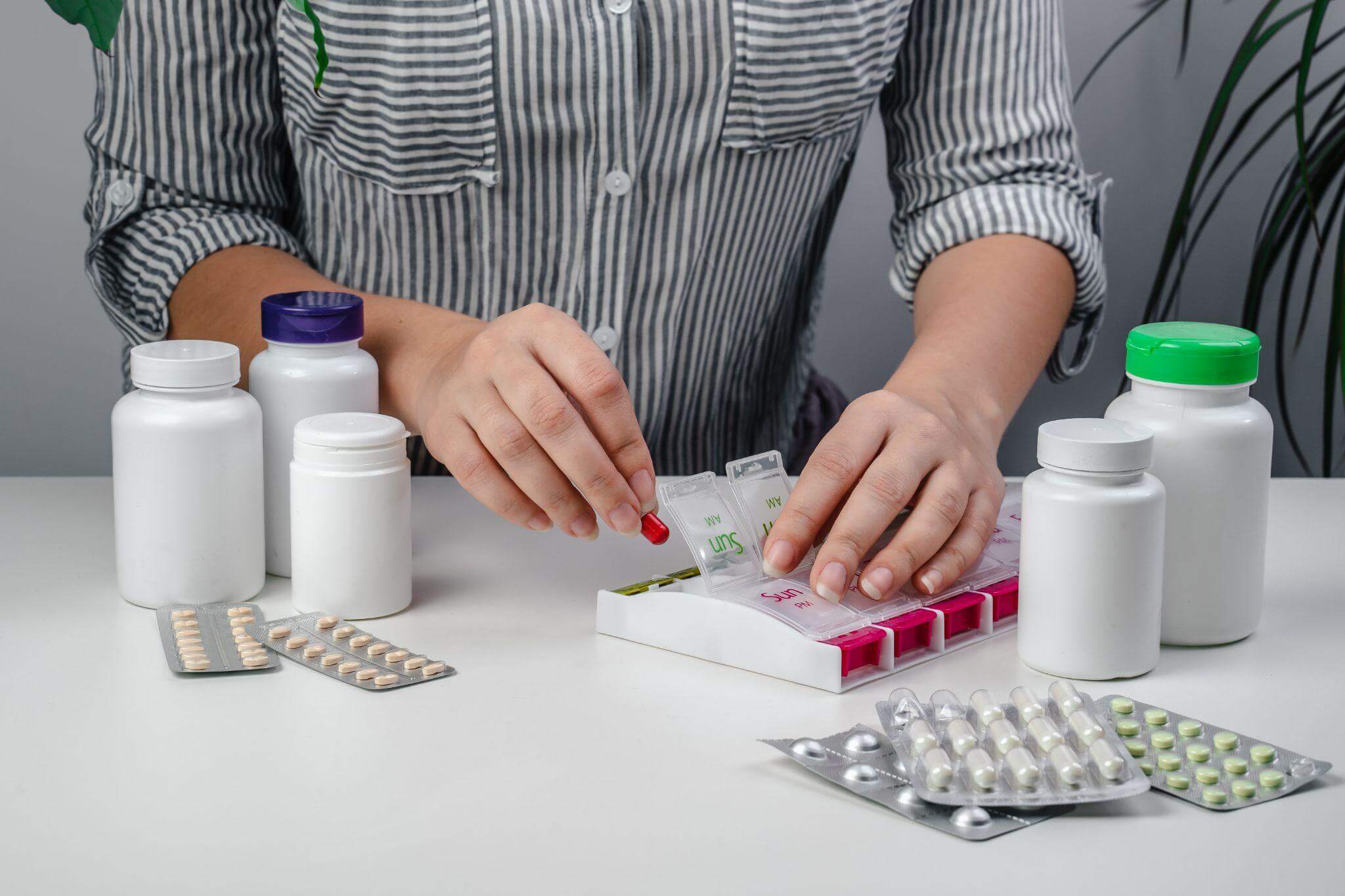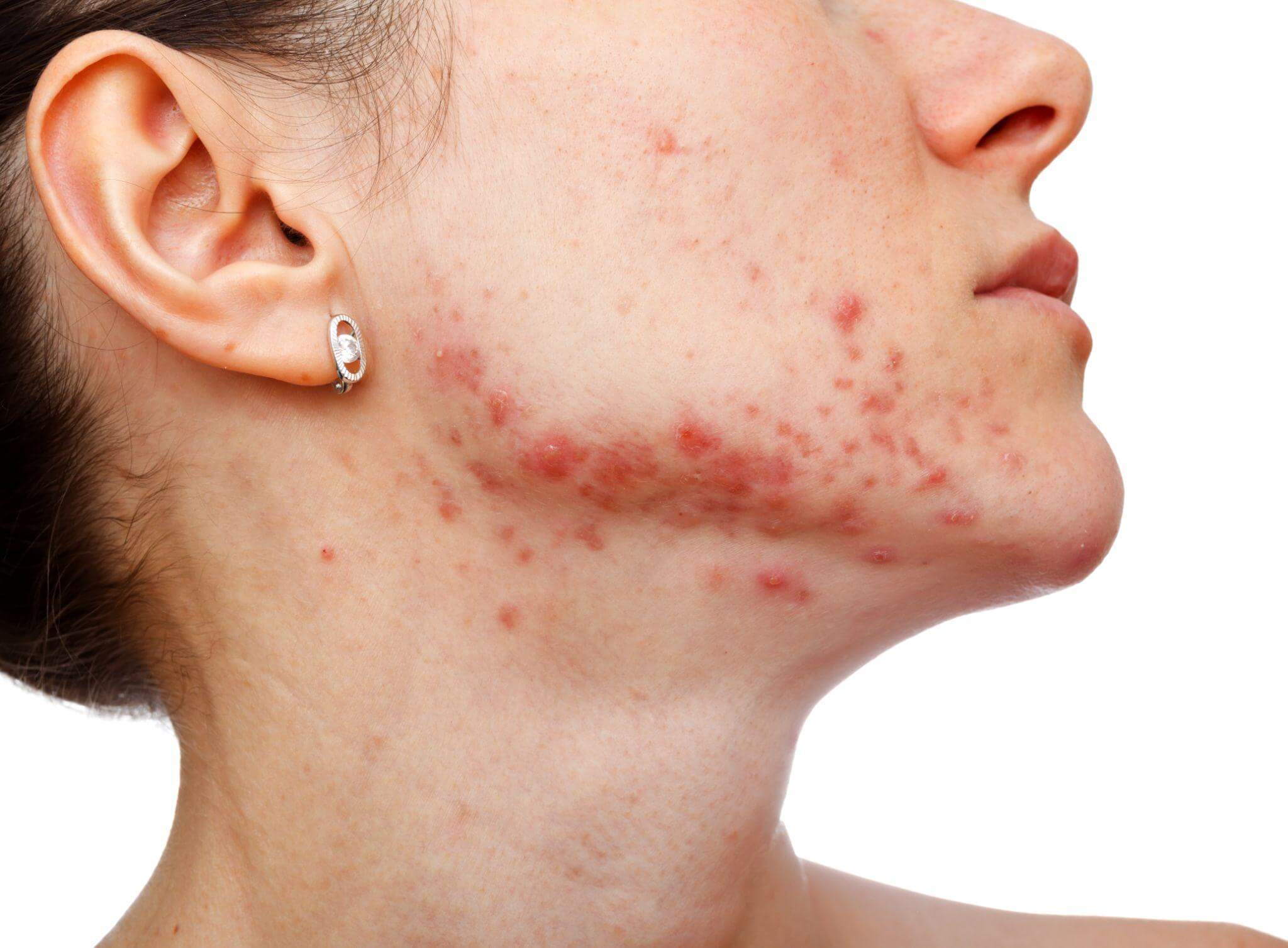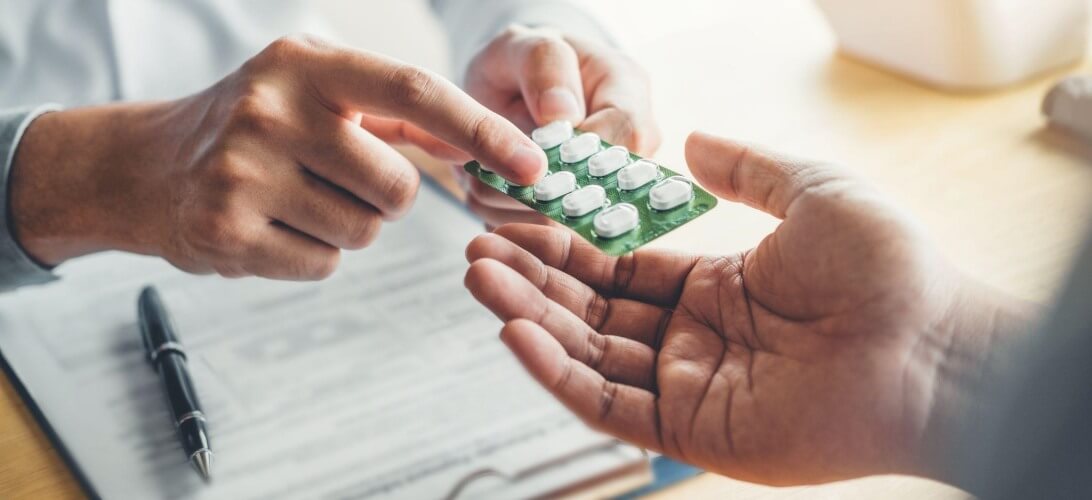Highlights
- There are 13 drug classes that can cause depression, including benzodiazepines and statins.
- Symptoms of depression don’t arise in everyone who takes these medications. Whether they do can depend on several factors.
- When drug-induced depression occurs, it’s possible to treat it using therapy or SSRIs or by changing to another drug.
Prescription medications are essential for many people. Sometimes, using that medication may cause symptoms of depression, or it can make depression worse. When medications may be causing depression, several treatment options are available. Prescribing doctors often need to strike the right balance between treating the underlying condition and managing the depression.
Symptoms of Depression

In 2020, 9.2 percent of people over the age of 12 experienced at least one major depressive episode.
If you experience any of the following signs or symptoms of depression every day for at least two weeks, you may have depression.
- Constantly feeling anxious, sad, or empty
- Feeling irritable, frustrated, and restless
- Constantly feeling pessimistic
- Feeling guilty and worthless
- Losing interest in hobbies and socializing
- Struggling to concentrate and make decisions
- Struggling to remember things
- Difficulty sleeping or sleeping too much
- Constantly feeling tired or lacking in motivation
- Aches and pains that have no clear physical cause
- Changes in appetite
- Weight loss or weight gain
- Suicidal thoughts
Medications Associated With Depression

There are more than a dozen drug classes associated with depression. It’s important to note that not everyone who takes them will experience symptoms of depression.
Here are the drug classes and medications that may cause depression in some people.
Benzodiazepines
Benzodiazepines are sedatives that doctors may prescribe to induce relaxation. They’re a central nervous system (CNS) depressant that increases the effect of the neurotransmitter gamma-aminobutyric acid (GABA) in the brain. Examples of benzodiazepines include diazepam, alprazolam, and lorazepam.
As of 2018, more than 30 million American adults use benzodiazepines. Common uses include treatment for insomnia, anxiety, and alcohol use disorder.
Whether benzodiazepines cause depression is controversial. Some ways they may bring on depressive symptoms include:
- Dysphoria. Benzodiazepines can induce a state of numbness described as dysphoria. This may cause people to feel as though they don’t care about what’s happening around them.
- Adaptation. The brain adapts quickly to benzodiazepines, which may cause previously existing depressive states to worsen. Some clinicians refer to this as rebound depression or rebound anxiety.
- Withdrawal syndrome. When withdrawing from benzodiazepines, symptoms such as insomnia and rebound anxiety may happen. If those symptoms continue, they may cause depression.
Statins and Lipid Blockers
Statins are drugs that doctors prescribe to lower low-density lipoprotein (LPL) levels. They act by slowing down the amount of LDL the liver produces. Commonly used statins include atorvastatin and simvastatin.
Studies offer different theories on whether statins and lipid blockers cause symptoms of depression. In a Swedish cohort study, atorvastatin increased the risk of depression, whereas simvastatin reduced it.
A comprehensive literature review suggests that statins are unlikely to cause depression in the general population. However, atorvastatin may make users more sensitive to anxiety-inducing stimuli. One explanation for this is that statins may increase C-reactive protein (CRP), which may worsen depression symptoms.
Proton Pump Inhibitors (PPIs)
Proton pump inhibitors (PPIs) are medications that reduce the amount of acid the stomach lining produces and are often prescribed to treat gastroesophageal reflux disease (GERD). They work by binding to the cells that produce acid and block that production.
Approximately 6.73 percent of the population use PPIs. Commonly prescribed PPIs are omeprazole and lansoprazole.
A 2022 study shows that 2.7 percent of people taking PPIs experience suicidal ideation, and 6.3 percent experience depression. With prolonged use, PPIs can reduce vitamin B12 absorption. Vitamin B12 deficiency may cause some forms of depression.
Anticholinergics
Anticholinergics are drugs that stop acetylcholine (ACh) from acting as it should. ACh is a neurotransmitter that affects many body functions. Doctors may prescribe anticholinergics for overactive bladder syndrome, Parkinson’s disease, and other conditions.
Around four percent of the population use drugs with anticholinergic properties. Anticholinergics can include benztropine and dicyclomine.
Anticholinergics don’t just block ACh in the area they’re targeting. If someone takes them to control their bladder, the drug still exerts effects on ACh receptors throughout the body. If anticholinergics pass the blood-brain barrier, they cause changes there.
As anticholinergic loads increase, so does the risk of cognitive decline. A reduction in cognitive function may cause depression or produce depressive-like symptoms. The risk of this happening may be higher in older people, as the blood-brain barrier becomes more permeable with age.
Beta Blockers
Beta blockers are drugs that slow the heart rate. They achieve this by blocking the action of certain hormones, including adrenaline. Doctors usually prescribe them to treat anxiety and some cardiovascular conditions.
In the United States, beta blockers are one of the most commonly used drugs. Beta blockers can include propranolol, atenolol, and carvedilol.
A meta analysis of studies investigating the link between new beta blocker use and depression suggests that propranolol may mildly increase the risk in people taking it short term who also have an underlying neuropsychiatric disorder. The study did not find this result in long-term users of propranolol or any other beta blocker studied.
Hormone-altering Drugs

Hormone-altering drugs include drugs used to treat menopause, hormone therapy used for treating cancer, and feminizing hormone therapies. Hormone replacement therapy replaces estrogen during menopause. Other hormone-altering drugs block androgen receptors to prevent testosterone from working.
How hormone-altering drugs affect the risk of depression can vary according to why they’re used and at what stage of life.
- Estradiol. Estradiol can improve menopausal symptoms and may actually reduce depressive symptoms when taken soon after the onset of perimenopausal symptoms. However, estradiol may increase the risk of cognitive decline, which can lead to depression, in those over 65.
- Tamoxifen. Tamoxifen is a drug used to treat breast cancer. In one study, 60 percent of users reported cognitive problems, including brain fog. Cognitive problems are often associated with depression.
- Oral contraceptives. The link between oral contraceptives and depression isn’t fully understood. Changes to estrogen and progesterone levels may result in depressive symptoms. One study shows that the link between oral contraceptives and depression is highest with progestin-only pills.
- Feminizing hormone therapy. Non-binary persons and transgender women use feminizing hormone therapies to introduce the effects of female hormones. Drugs like spironolactone are used to block androgen receptors. The link between these drugs and depression is weak, but evidence suggests they can increase cortisol levels, which can lead to depression in some individuals.
Corticosteroids
Corticosteroids are anti-inflammatory drugs that treat conditions such as rheumatoid arthritis, allergies, short-term relief of some respiratory conditions. They include prednisolone, prednisone, and hydrocortisone.
Corticosteroids influence a variety of signal pathways that can contribute to inflammation. They mimic the way cortisol acts and can suppress serotonin production. Regular use of corticosteroids can cause depression.
How severe corticosteroid-induced depression is can depend on the type being taken and its dose. A literature review revealed that up to six percent of people taking them may experience severe symptoms, and 27 percent may have mild to moderate symptoms.
Stimulants
Stimulants help to promote wakefulness and focus in those who have ADHD, narcolepsy, and similar conditions. Commonly prescribed stimulants include methylphenidate and lisdexamfetamine.
Stimulants increase focus by increasing certain neurotransmitters, including dopamine and norepinephrine.
Some studies have concluded that long-term use may actually reduce the risk of depression. However, other evidence suggests that methylphenidate may worsen major depressive disorder. It may be that some stimulants cause depression in certain individuals, making it important for doctors to change medications if signs of depression arise.
Acne Medications (Retinoids)

Oral retinoids can make psoriasis less severe and unclog pores. They’re also effective in treating acne. Doctors may prescribe retinoids like isotretinoin when other treatments, including antibiotics, don’t work.
Studies that examine the link between isotretinoin and depression often find individual cases of neuropsychiatric side effects. However, other studies find that isotretinoin mostly reduces the risk of depression. FDA guidelines state doctors should exercise caution when patients have a personal or family history of depression.
Pain Relievers (Opioids)
Opioids interact with pain receptors in the brain to produce morphine-like effects. They’re useful for treating pain following surgery and injuries as well as cancer-related pain.
In 2020, the opioid dispensing rate was 43.3 prescriptions per 100 people. This class of drugs includes tramadol, oxycodone, and fentanyl.
Using opioids stimulates the brain’s rewards system. As time goes on, users may need to take more opioids to achieve the same effect. Research reveals that there’s a link between opioid use and depressive symptoms, perhaps with a genetic component.
Allergy Medications
Allergy medications make allergy symptoms less severe by blocking a chemical called histamine. They’re useful for treating seasonal allergies, conjunctivitis, and insect stings.
Around 50 percent of the population used antihistamine tablets during 2021. Popular antihistamines include cetirizine and diphenhydramine.
Not all allergy medications cause depression. Patients who use cetirizine and hydroxyzine are more likely to report depressive symptoms.
There’s evidence to suggest that antihistamines may reduce the efficacy of SSRIs. Antihistamines may affect the brain’s ability to respond to serotonin, resulting in depressive symptoms.
Antibiotics
There’s some evidence to suggest that recurrent antibiotic use may cause depression and anxiety. The evidence is especially strong for penicillins such as amoxicillin.
Taking antibiotics can reduce the amount of good bacteria in the gut. Evidence suggests that there’s a link between healthy gut flora and good mental health.
Drug-Induced Depression Risk Factors

Drug-induced depression isn’t always as straightforward as taking a certain drug and depression then arising. Lots of factors come into play, meaning not everyone who takes a medication associated with depression will become depressed.
Common risk factors for medication-induced depression include:
Substance Misuse
Substance misuse is a real risk for people taking certain medications. In 2020, 40.3 million Americans aged over 12 had a substance use disorder (SUD), including the misuse of prescription drugs.
Substance abuse can trigger or worsen some feelings that come with depression. There are several reasons why this might happen.
- Existing depression. Using certain substances may cause a temporary sense of relief from depressive symptoms. However, when the high wears off, those symptoms may feel worse.
- Social consequences. Substance abuse can cause social consequences, such as relationship breakdowns and financial struggles. When those struggles cause too much stress, they can lead to depression.
- Brain adaptation. The brain adapts rapidly to certain medications, including benzodiazepines. After a while, users may need more of the same drug to get the effect they need.
Existing Depression
Some drugs associated with depression might not cause the condition but may worsen it. When depression already exists, it’s important to monitor the effects of certain drugs.
Patient Background
Certain individuals may be more susceptible to drug-induced depression than others. Factors that may predispose some people to its effects include:
- Family history. Individuals with first-degree relatives with histories of depression are at higher risk.
- Stressful life events. Stressful periods may predispose someone to rely on drugs for relief.
- Existing conditions. Existing medical conditions can also trigger depression. It’s sometimes difficult to determine whether the condition or the treatment is causing the depression. If the medication is causing the depressive symptoms, stopping it will resolve them. However, never stop a prescribed medication without talking it over with your provider first.
Diagnosing Drug-Induced Depression

There’s no strict diagnostic criteria for drug-induced depression. Instead, it’s often a diagnosis of exclusion, where a doctor needs to rule out other causes first.
Your doctor may want to rule out:
- Existing depression. It’s important to identify whether the depression existed before taking the drug.
- Life events. Depression starting around the same time as using a drug co-occurring with a stressful life event may indicate that the drug isn’t to blame.
- Comorbidities. Doctors may also examine whether an existing condition or an exacerbation of one is causing the depression.
When a doctor suspects that a drug is causing or worsening depression, they may guide their patient through stopping the medication. It’s important not to go through this process alone, as stopping certain drugs suddenly can cause further harm.
Complications Associated With Drug-Induced Depression
The complications associated with drug-induced depression can vary between patients but may include:
- Worsening conditions. When someone is aware or suspects their drug is causing depression, they may stop taking it. Stopping a drug can cause symptoms to return or worsen. With certain medications, such as beta blockers, this may make existing conditions worse.
- Treatment adherence. People who experience problems with one drug may feel reluctant to start another. This is especially likely when stopping that drug lifts their mood. Consequently, they may struggle to adhere to future treatments that are vital for maintaining their health.
- Suicide. Relying on a drug to feel better may cause feelings of hopelessness when it’s causing other problems. In some cases, drugs that worsen depression may trigger suicidal thoughts.
Treatment for Drug-Induced Depression

Experiencing mood-related problems with one drug doesn’t mean that all treatment avenues are exhausted. In many cases, there are other options.
Your doctor might suggest trying one or more of these approaches:
Watchful Waiting
Watchful waiting is an approach that involves closely monitoring a patient who experiences symptoms of depression. If the patient’s symptoms improve, it may be that there was another cause for their depression and the drug is safe to continue.
Other Medications
When trialing drugs in the same class doesn’t work, it may be possible to explore other classes. Sometimes doctors may need to take an “off-label” approach. This means prescribing a drug that the FDA has not approved for a particular condition because there’s evidence that it can safely treat that condition. For example, Lexapro is approved by the FDA for the treatment of major depression, but it’s often prescribed off-label for the treatment of bipolar disorder as well.
Selective Serotonin Reuptake Inhibitors (SSRIs)
SSRIs are commonly prescribed for depression. When there are no contraindications between an SSRI and the drug causing depressive symptoms, it’s sometimes advisable to use one.
SSRIs include sertraline and fluoxetine. Around 40 to 60 percent of people who take antidepressants notice improvements in their depressive symptoms within six to eight weeks.
Therapy
In cases of mild to moderate depression, therapy is often helpful. Psychotherapy can involve one or more of the following:
- Changing circumstances. Therapists can help to identify events and circumstances that contribute to depression. From there, they can help patients adapt to those circumstances.
- Setting goals. Setting and achieving realistic goals is a useful way to reduce depressive symptoms.
- Challenging thoughts. Challenging unhelpful thoughts and behaviors can tackle negative feelings.
- Problem solving. Learning problem-solving skills can make it easier to overcome everyday challenges.
Lifestyle Changes
Some lifestyle changes can have a positive impact on depression. They include:
- Abstaining from alcohol. Alcohol can negatively affect brain chemistry. While it may induce relaxation initially, it can worsen anxiety the next day. Finding other ways to relax can make depression better.
- Exercise. Exercising can reduce stress levels and boost serotonin. It may also improve memory.
- Stress management. Wherever possible, it’s wise to avoid known stressors. Replacing stressful situations with fun activities can increase happiness.
- Relationships. Spending time around loving and supportive people is important when feeling depressed.
- Diet. Maintaining a healthy and balanced diet can promote good mental wellbeing. The right diet can protect the gut’s bacteria and balances energy levels to support everyday activities.
Get the Lowest Price for Depression Medications
At BidRx, you can compare the prices of medications used to treat depression or an alternative medication to one that causes depressive symptoms. After you enter your bid, available pharmacies will present their best prices. You can choose the price and service that meets your needs.
Find your medications at BidRx and place your bid today!
